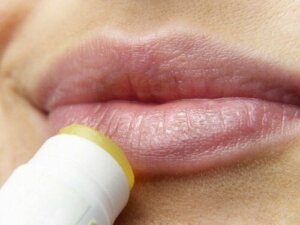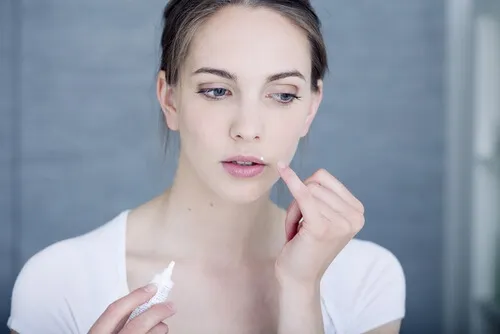Zoviduo for Cold Sores


Reviewed and approved by the dentist Vanesa Evangelina Buffa
Zoviduo is a drug composed of two active ingredients: acyclovir and hydrocortisone. Acyclovir is a drug that acts against viruses, specifically the virus that causes cold sores.
The other compound in Zoviduo, hydrocortisone, is a medium-strength corticosteroid that works by reducing the inflammation associated with cold sores. As an anti-inflammatory, it reduces cold sore symptoms.
How does Zoviduo work?
Zoviduo is a cream that’s recommended to relieve the early signs and symptoms of cold sores. These signs and symptoms include a tingling sensation, itching, and redness.
It also offers another advantage – it reduces the risk of the cold sore running its course and blistering. However, if blisters do occur, this cream reduces how long they take to heal.
What is a cold sore?
A cold sore is a common infection caused by the herpes simplex virus. The virus enters the cells of the mouth and causes the formation of small, fluid-filled vesicles clustered together.
When the blisters rupture, they create ulcerations and scabs. The lesions occur especially on the lips, although sometimes other areas of the face and mouth near the lips are affected.
As it’s an infection caused by a virus, it’s very easy to pass from one person to another. For this reason, while the infection is active, it’s necessary to avoid direct contact between people and to avoid sharing objects that come into contact with the mouth.
The origin of cold sores can be associated with a lowering of defenses, sometimes due to common respiratory infections such as a cold. It can also be caused by stress, the consumption of certain foods, or exposure to the sun.
Read another great article: Symptoms and Treatment of Herpes Zoster in Children
What are the symptoms of cold sores?
A cold sore evolves in several phases:
- Itching and tingling phase: It’s common to experience an itching or burning sensation on or around the lips, even before the lesions appear.
- Blistering: If blisters form, they appear along the edge of the lips, although herpes can appear on the nose or cheek area as well.
- Crusting phase: This last stage occurs once the blisters have opened and the fluid inside them has oozed out.
However, symptoms vary depending on whether it’s the first outbreak or a flare-up. Herpes tends to reappear in the same place over and over again, as the virus remains in the body and takes advantage of the drop in defenses to manifest itself.
Sometimes, when it’s the first outbreak, you may get fever, a sore throat and a headache, as well as muscular pain and changes in the gums. The lesions in the mouth are very characteristic, but at the beginning, until the blisters appear, the diagnosis isn’t clear.
How is Zoviduo used?
Before applying Zoviduo, it’s important to remove all traces of cosmetics you may have on your lips. It’s highly recommended to wash your hands before and after applying Zoviduo.
To achieve the best results with this treatment you should apply it as soon as you experience the burning, swelling, or itching sensation, i.e. before the lesions appear. The earlier you do it, the easier it is to prevent the development of blistering, and, in turn, to accelerate the reduction of symptoms.
The prescribed dosis is five applications per day, using the necessary amount to cover the affected area well. In general, five days of use is sufficient. If after this time there’s no improvement and the discomfort continues, a doctor should be consulted to consider other treatment.
What adverse effects may occur?

Zoviduo, like any other medication, may cause side effects, although they’re rare. The side reactions that may occur are classified according to the frequency they can appear in:
- Frequent: Skin dryness and peeling.
- Infrequent: Transient burning, itching, tingling, or stinging after application.
- Rare: Skin redness, erythema, or localized skin irritation with a burning sensation.
In addition, an allergic reaction may occur, in which case you should seek medical advice. Allergic symptoms are a swelling of the face, tongue, or throat, difficulty in breathing or swallowing, and urticaria. If these symptoms appear, it’s advisable to stop using Zoviduo.
You may also be interested in: Why Do We Get Cold Sores?
Zoviduo at the onset of symptoms
Zoviduo is an effective medication when it’s applied as soon as you begin to feel the first signs of cold sores, such as burning, itching, or pain in the affected area. Applying it quickly improves the chances of reducing the time of discomfort, although it doesn’t cure the disease. Cold sores are chronic and recur from time to time.
All cited sources were thoroughly reviewed by our team to ensure their quality, reliability, currency, and validity. The bibliography of this article was considered reliable and of academic or scientific accuracy.
- Studahl, M., Cinque, P., & Bergström, T. (2005). Herpes simplex viruses. Herpes Simplex Viruses. https://doi.org/10.3109/9781420073133-5
- Nikkels, A. F., & Pièrard, G. E. (2002). Treatment of mucocutaneous presentations of herpes simplex virus infections. American Journal of Clinical Dermatology. https://doi.org/10.2165/00128071-200203070-00004
- Bieber, T., Chosidow, O., Bodsworth, N., Tyring, S., Hercogova, J., Bloch, M., … Tyring, S. K. (2014). Efficacy and safety of aciclovir mucoadhesive buccal tablet in immunocompetent patients with labial herpes (LIP trial): A double-blind, placebo-controlled, self-initiated trial. Journal of Drugs in Dermatology.
- Muñoz Hiraldo, E., & Morillo Gutiérrez, B. (2017). Infecciones por virus herpes simple. Asoc Española Pediatría Atención Primaria, 1(5), 1-33.
- Jacomet, M. À. P., Sabaté, L. R., Diego, L., & Vallejo, C. D. (2022). Uso seguro de medicamentos tópicos II: infecciones bacterianas, fúngicas, víricas y parasitarias. FMC-Formación Médica Continuada en Atención Primaria, 29(6), 340-346.
- Repetto, G. (2019). Aciclovir: nuevo antiviral. ARS MEDICA Revista de Ciencias Médicas, 44(1), 27-31.
This text is provided for informational purposes only and does not replace consultation with a professional. If in doubt, consult your specialist.








